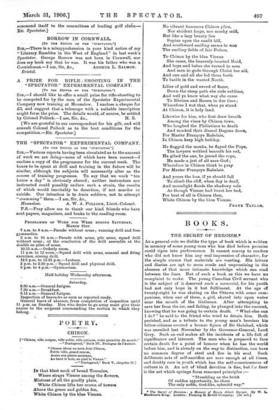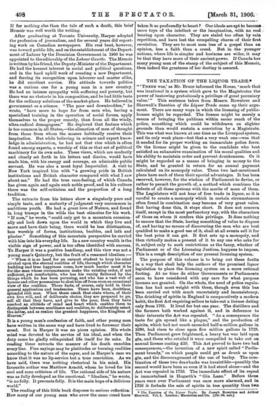BOOKS.
THE SECRET OF HEROISM.'
As a general rule we dislike the type of book which is written in memory of some young man who has died before promise could ripen into performance. It cannot convey to readers who did not know him any real impression of character, for the simple reason that materials are wanting. His letters and diaries are apt to seem crude and unpromising in the absence of that more intimate knowledge which can read between the lines. But of such a book as this we have no complaint to make. The young Canadian Civil servant who is the subject of it deserved such a memorial, for his youth had not only hope in it but fulfilment. At the age of twenty-eight he was skating on the Ottawa with some com- panions, when one of them, a girl, skated into open water near the mouth of the Gatineau. After attempting to save her from the ice, and failing, he plunged into the current, knowing that he was going to certain death. "What else can I do?" lie said to the friend who tried to detain him. Both perished, and as a tribute to the young man's heroism his fellow-citizens erected a bronze figure of Sir Galahad, which was unveiled last November by the Governor-General, Lord Grey. Such an end makes all the incidents of a life full of significance and interest. The man who is prepared to face certain death for a point of honour when be has the world before him, and is already on the way to distinction, can have no common degree of steel and fire in his soul. Such deliberate acts of self-sacrifice are rare enough at all times, and doubly rare in youth which has the self-consciousness of culture in it. An act of blind devotion is fine, but fur finer is the act which springs from reasoned principles :- Stumbling on the brink
Of sudden opportunity, he chose The only noble, God-like, splendid way."
* The Secret of Heroism : a Memoir of Henry Albert Harper. By W. Mackenzie King. London : Fleming H. Revell Company. [3s. net.]
If for nothing else than the tale of such a death, this brief Memoir was well worth the writing.
After graduating at Toronto University, Harper adopted the profession of journalism, and for several years did report- ing work on Canadian newspapers. His real bent, however, was toward public life, and on the-establishment of the Depart- ment of Labour by the Dominion Government in 1900 he was appointed to the editorship of the Labour Gazette. The Memoir is written byhis friend, the Deputy-Minister of the Department. He had the keenest interest in social and political questions, and in the hard uphill work of creating a new Department, and forcing its recognition upon labourer and master alike, he did excellent service. His attitude towards politics was a curious one for a young man in a new country. He had an intense sympathy with suffering and poverty, but there was no rhetoric in his composition, and be had little taste for the ordinary solutions of the market-place. He believed in government as a science. "The poor and downtrodden," he wrote, "have more to hope for from men who, having a specialized training in the operation of social forces, apply themselves to the proper remedy, than from all the windy, ultra-radical demagogues." He deplored that feature which is too common in all States,—the alienation of men of thought from those from whom the masses habitually receive their inspiration. But while believing in science and expert know- ledge in administration, he had not that vice which is often found among experts, a worship of this or that set of political machinery for its own sake. These views, which are modestly and clearly set forth in his letters and diaries, would have made him, with his energy and courage, an admirable public servant. He was also a most loyal Imperialist. A visit to New York inspired him with "a growing pride in British institutions and British character compared with what I saw about me." He had the true race-feeling, of which Canada has given again and again such noble proof, and in his culture there was the self-criticism and the proportion of a long tradition.
The extracts from his letters show a singularly pure and simple taste, and a maturity of judgment very uncommon in ambitious youth. He had a great love of Nature, and found in long tramps in the wilds the best stimulus for his work. "If men," he wrote, "could only get to a mountain occasion- ally and look down upon the world in which they live and move and have their being, there would be less dilettantism, less worship of forms, institutions, baubles, and lath and plaster." Something of this mountain perspective he carried with him into his everyday life. In a new country wealth is the visible sign of power, and is too often identified with success. To Harper it was a positive handicap, and this view was not a young man's Qnixotry, but the fruit of a reasoned idealism :—
"When it is so hard for an earnest student to keep his mind riveted upon the eternal realities of life, through which character building and true happiness come, how much harder must it be for the man whose circumstances make the existing order, if not sufficient, yet comfortable, who has his vanity flattered by the things which he has been pursuing, and who has a vast web of houses and other possessions to shut him off from even an occasional view of the realities. These facts, of course, only hold in their general application and tendencies. There have been, doubtless, spifindid rich men. When these reach that state where, of their own free will, and of deliberate choice, they are prepared to go, sell all that they have, and give to the poor, then they have reached an altitude of mind and heart which enables them to distinguish between semblance and realities, to deliberately select the latter, and so realize the greatest happiness, the Kingdom of Heaven."
It is a young man's confession of faith, and other young men have written in the same way and have lived to forswear their creed. But in Harper it was no pions opinion. His whole mind was devoted to the service of his ideal, and when the
duty came he gladly relinquished life itself for its sake. In reading these extracts the manner of his death ennobles every line. Fine sayings may be platitudes or burning realities according to the nature of the sayer, and in Harper's case we know that it was no lip-service but a true conviction. As we have said, there was nothing rhetorical in his mind. His favourite author was Matthew Arnold, whom he loved for his cool and sane criticism of life. The rational side of his nature was as fully developed as the emotional. "Idealism," he wrote, "is no folly. It prevents folly. It is the main hope of a delirious world."
The reading of this little book disposes to serious reflection.
How many of our young men who avow the same creed have taken it so profoundly to heart P Our ideals are apt to become mere toys of the intellect or the imagination, with no real bearing upon character. They are staled too often by vain repetition, and have lost the compelling charm of their first revelation. They are to most men less of a gospel than an opinion, less a faith than a creed. Bat in the younger nations, where life is simpler and horizons are wider, it may be that they have more of their ancient power. If Canada has many young men of the stamp of the subject of this Memoir, then indeed the greatness of her destiny is assured.











































 Previous page
Previous page